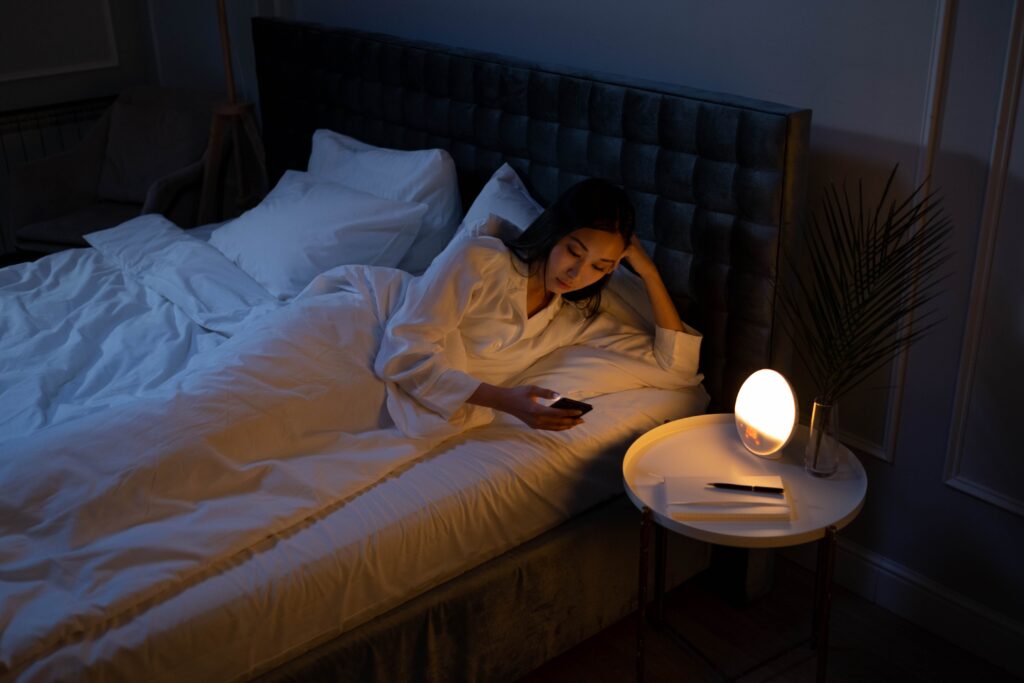For many individuals, the nighttime hours bring a sense of calm and tranquility. However, for those grappling with anxiety, the arrival of nightfall can often amplify their inner struggles. Why does anxiety seem to intensify during the nocturnal hours? In this article, we will explore some potential reasons behind this phenomenon and provide insights to help you better understand managing nighttime anxiety.
Here are 5 reasons why you may be afflicted with bothersome nerves that even late night TV can’t cure.

Reduced Distractions
As the day winds down and the external noise diminishes, our minds have fewer distractions to occupy our thoughts. This can allow anxious feelings to surface more prominently, as we have fewer external stimuli to divert our attention from them.
Reflection and Overthinking
Nighttime often offers a more conducive environment for self-reflection and introspection. Without the busyness of the day, we may find ourselves ruminating over past events, worrying about the future, or engaging in overthinking. This increased mental activity can escalate anxiety levels and make it challenging to find respite.
Biological Factors
Our body’s natural circadian rhythm plays a role in regulating our emotions. The circadian system influences the production and release of various hormones and neurotransmitters, including cortisol, which is associated with stress. During nighttime, disruptions to this rhythm can result in an imbalance of these chemicals, potentially triggering or intensifying anxiety symptoms.
Less Social Support
Nighttime often means fewer opportunities for social interactions and support. The absence of close friends, family, or support networks can make feelings of loneliness or isolation more pronounced, leading to heightened anxiety levels.
Lack of Distraction Techniques
During the day, we engage in various activities that can serve as healthy distractions from anxiety. However, at night, these options may be limited. The absence of outlets such as exercise, hobbies, or social events can make it more challenging to redirect our focus and assist with managing anxiety-rich thoughts.
So what can I do to soothe my nerves and get a good night’s rest?
Here are some common coping strategies for nighttime anxiety:
Establish a Relaxing Bedtime Routine
Engage in calming activities before bed, such as reading, taking a warm bath, or practicing relaxation techniques like deep breathing or meditation.
See: Top 10 Books for Managing Anxiety
Manage Screen Time
Limit exposure to electronic devices, particularly before bedtime, as the blue light emitted can disrupt sleep patterns and contribute to heightened anxiety.
Adopt Healthier Habits
Sometimes, a healthy diet is the key to most bodily issues you may experience, including sleep. Try utilizing exercise and healthy ways to lose weight in order to regain your nighttime balance.
Create a Supportive Sleep Environment
Ensure your bedroom is conducive to relaxation and sleep. Use blackout curtains, soothing scents, and comfortable bedding to promote a sense of calm.
Write Down Worries
Keep a journal by your bedside to jot down any anxious thoughts that arise. This can help offload your mind and provide a sense of closure before attempting to sleep.
Seek Professional Help
If nighttime anxiety persists and significantly impacts your daily life, consider reaching out to a mental health professional who can provide guidance, support, and additional coping strategies.
Remember, managing nighttime anxiety is a process that requires patience and self-compassion. By implementing these strategies and seeking support when needed, you can take steps towards better managing anxiety during the night and fostering a more restful and peaceful sleep.
Conclusion
Understanding why anxiety can intensify at night is an important step towards effectively managing this challenging experience. Thus, by recognizing the factors and reasons that contribute to nighttime anxiety and implementing coping strategies, you can reclaim a sense of calm and promote better sleep hygiene. Remember, you are not alone, and with time and practice, you can find peace during the nighttime hours and overcome the grip of anxiety.
About Us
Our mission is to provide a trusted and comprehensive resource hub where individuals can find inspiration, guidance, and practical tools to better themselves. Through our carefully curated content, we aim to address various aspects of personal development, including self-confidence, motivation, mindset, relationships, productivity, and overall well-being. Awaken the Champ is reader-supported. When you buy through links on our site, we may earn an affiliate commission.

